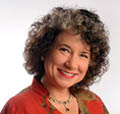Do you doodle? And what do you do now, if you don't doodle anymore?
I'm a serious doodler. It helps me think better: It helps me focus on what I'm hearing instead of falling asleep or thinking of other stuff entirely. When I doodle, it's like part of my brain can go outside for recess while the rest of me sits up straighter and pays more attention.
In meetings, on the phone and at conferences, you'll see me doodling.
My friend, writer and cartoonist Amy F. Sherman, puts it this way: "Anything that helps occupy the mind while it's sorting through other stuff is good. Doodling is like white noise with a pen."
My worry now is that as we become an increasingly paper-free society, The Doodle will become as extinct as the Dodo. We'll have to create dimly-lit rooms in museums to showcase scraps of paper where once people drew flying cars, dinosaurs, linked triangles or horses in order to explain to the next generation what doodling once was.
Has Googling replaced doodling? I don't think it's an improvement.
The word "doodle" is related to dawdling, idling and frittering away time; while essentially frivolous, is still not actually trivial. We're creating something, however ephemeral. It's like whistling. We're not inventing something for the ages and yet part of us is indeed engaged in the act of creation.
Surely that matters, even if we have a limited and distinct repertoire?
For example, I draw houses, clouds, kites, hearts, flowers and kitty cats. That's it. I have remained, in terms of doodling, 6 years old.
It seems that not only are our doodle patterns formed early in life, but that they appear to be conventionally gender-specific. A friend and former student named Hanley admits that as an inveterate doodler now in his 30s, he still draws "ghouls and goblins, mostly macabre stuff."
As an undergraduate, Hanley would usually sit in one of the front rows of my classroom. When I'd see him drawing grotesque eyeballs in the margins of his notebook, I knew he was invested in the work under discussion. "Oh, that kid's drawing a UFO. I must be onto something here." That's the kind of pedagogy they don't teach you in graduate school.
I also knew that doodling was an aid to, and not a distraction from, concentration because I have my own notebooks going back to high school.
The only clues about my imaginative life appear in the margins: In 10th grade I was all about imitating the artist Peter Max when drawing my clouds and flowers. I even carried colored Flair pens in my knapsack (which in those days were military surplus) to enliven my marginalia.
I drew intricately patterned hearts - some broken, for full sentimental effect - next to detailed notes on metaphor and simile in "Romeo and Juliet." I illustrated lyrics from songs by Joni Mitchell ("But now old friends are acting strange …"), Janis Ian ("Those of us with ravaged faces …") and John Denver ("You fill up my senses …") as I copied down information on plate tectonics and soil erosion. Who needed an iPod when you could hear the songs in your head as you reviewed your notes from earth science?
Naturally, I also wrote out what I thought my married name would look like. I doodled so many versions of "Mrs. Gina So-and-So" that I lost my appetite for the experience; when I did marry, I did not change my name.
I did well in school; doodling helped. Will others lose out when we go digital?
I've heard of programs that permit a kind of virtual doodling via the computer screen, but I can't imagine that it has the same visceral or psychological implications.
It's the scratch of pencil on the back of an envelope, the ink bleeding through the edge of the cocktail napkin or the back of a receipt, the pen's circles at the bottom of the page that help make the connection with the part of yourself that usually hides in the shadows and emerges only in your mind's peripheral vision. The sound of the instrument on the page brings it out.
It's not only Yankees who should doodle. Get thee to the margins.
Gina Barreca
The Hartford Courant
(TNS)
Comment by clicking here.
Gina Barreca is a columnist for The Hartford Courant.



 Contact The Editor
Contact The Editor
 Articles By This Author
Articles By This Author